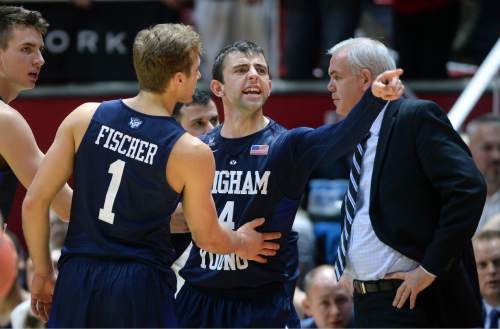This is an archived article that was published on sltrib.com in 2015, and information in the article may be outdated. It is provided only for personal research purposes and may not be reprinted.
In BYU's Student Athlete Building, there are inspirational quotes displayed from ecclesiastical leaders, bits of wisdom pertaining to living a good Christian life from what the school's owner, The Church of Jesus Christ of Latter-day Saints, considers modern prophets and apostles.
On one wall are the words of church President Thomas S. Monson: "Ours is the opportunity to lift, to inspire, and indeed to lead."
On another, in bold letters, is the following charge: "To be the flag-bearer of Brigham Young University through football excellence, embracing truth, tradition, virtue and honor as a beacon to the world."
That's what some people, including church and school leaders, believe BYU sports teams to be — missionary tools and beacons to a lurching world.
The only problem with that notion is when they are not beacons, when they are brutes and cheap-shot artists, when they punch opponents in full view of television and video cameras, and then those images are shown on highlight replays or posted online for millions to see.
And that's exactly what happened during BYU's basketball game against Utah at the Huntsman Center on Wednesday night, when Nick Emery punched Utah guard Brandon Taylor, dropping him to the floor. The Cougar freshman was given a flagrant-2 foul and ejected from the game, and the video went viral on the web. Not only did it go viral, it also was the subject of many commentaries online and on local and national sports shows. One commentator said the incident was another case of BYU players doing BYU things. A headline on a popular site read: "BYU Continues to Be the Dirtiest School in College Sports."
Emery's punch followed images of BYU linebacker Harvey Langi punching a Utah State player as a teammate tackled the ball carrier, and BYU offensive lineman Ului Lapuaho punching a Boise State player straight in the tenders at the end of a play earlier this season, and BYU defensive lineman Bronson Kaufusi latching onto and rolling the leg of a Nebraska Cornhusker after the player was clearly on the ground, and the massive brawl that broke out at the end of last year's bowl game against Memphis in Miami.
At this rate, how many beacons does BYU really want its athletes to beam?
They don't look like messengers from God, sent to share the good word. They look like goon squads from a mob boss or a dirty politician, sent to bust chops and shut mouths.
This can't be what church and school leaders had in mind when they hoped BYU teams would set an example for all the millions of viewers out there looking not just for a football or basketball fix, but for a bright, shining light to follow. It's hard to imagine Fred and Myrtle or Cindy and Bill watching such incidents and thinking, "You know, hon, these guys in blue have something extraordinary about them, they've inspired me to live a better life."
It's kind of the equivalent of the Mormon Tabernacle Choir performing beautiful music at a revered concert hall and then trashing the place, tearing it up when the sweet singing is done. Picture that — Mack Wilberg slapping somebody across the grille with his sheet music, some dude from the tenor section breaking a chair over a patron's head.
There are always explanations, of course, for the punches and those unsavory images.
Typically, the rationalizing goes like this: The other guy(s) did something to draw out the nasty from the innocent BYU player(s). He was/they were just retaliating, answering bad intentions from opponents with a little justified payback. College sports' version of a black eye for a black eye, a busted tooth for a busted tooth, a punched onion for a punched onion. Avenging angels kind of stuff, because, as a band of brothers, you can't simply stand down when your mates are being roughed up.
A football field or basketball court is no place, apparently, to turn the other cheek.
It's just weird how it's the BYU players who so often are the ones who look bad. They're the ones being singled out in commentaries and headlines. They're the ones earning the dirty reputations.
For his punch, Emery has been suspended for a game. He apologized — to Taylor, to Utah coach Larry Krystkowiak, to fans of both teams, and said he would learn from the experience. After the game, before the apology, Taylor said: "It was a dirty play and I don't have respect for guys like those."
Emery's not a bad kid. He's a good basketball player. He did something really dumb, as he said it, "in the intensity of the game." He said he would "do better in representing myself, the team and BYU."
Still, as long as BYU projects itself and more specifically its athletes as something special to showcase, when they do really dumb things, those things will be underscored and accentuated. And really dumb things seem to happen too often, more often than they do at less "enlightened" places.
Maybe the coaches should get that under control. Or maybe the school should dial in on what's real there. Even if BYU believes it has its share of religious truth, it shouldn't necessarily see its teams and athletes as beacons to the world, rather it should see them as ordinary human beings trying to get by in this life, young people who make mistakes and have lessons to learn, just like everybody else.
GORDON MONSON hosts "The Big Show" with Spence Checketts weekdays from 3-7 p.m. on 97.5 FM and 1280 AM The Zone. Twitter: @GordonMonson.



